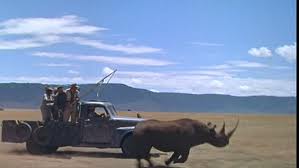 “Hatari.” I think it is the first Swahili word that I ever learned. I remember it because I relate it to the longest line that I have ever stood in to see a movie. Yes, it was the old Ritz theatre in Big Spring, Texas. John Wayne’s new movie attracted so much attention that the line literally went around the block of 4th and Main Street. For a little kid like me, it was a spellbinding adventure in Africa where John Wayne was in search of Rhinos and other wild animals. I was captivated with the movie and found out that Hatari means “danger.”
“Hatari.” I think it is the first Swahili word that I ever learned. I remember it because I relate it to the longest line that I have ever stood in to see a movie. Yes, it was the old Ritz theatre in Big Spring, Texas. John Wayne’s new movie attracted so much attention that the line literally went around the block of 4th and Main Street. For a little kid like me, it was a spellbinding adventure in Africa where John Wayne was in search of Rhinos and other wild animals. I was captivated with the movie and found out that Hatari means “danger.”
Hatari is still prevalent in Africa. I found out about it last week. As Francis Bii, our CRF director of relief in the Horn of Africa, was on the road for Dadaab, he communicated with me about a Hatari situation. CRF brings food to refugee camps in the Horn of Africa. Dadaab was built for about 30,000 refugees and now there are about as many people as in the city of Seattle. So there is simply not enough food and water. Francis was to bring a couple of big truckloads of food into the camp when he asked me if he could turn around. First of all, three other relief workers had just been killed—not from CRF but fellow workers in the effort. And to make matters worse, he had to maneuver around land mines to get there. Yes, enemies were trying to stop relief workers from helping—Hatari.
It is hard to believe that it could be so dangerous to help people. But in this particular effort, relief workers are in great danger of being killed or kidnapped. When you live where I live, it seems inconceivable that you could be in such danger by delivering food. In fact, I usually think of myself as living in a very safe place. Or do I?
Years ago I was teaching a class for some ministers in Uganda. A couple of ministers in Sudan hopped on a bus to travel down for the class. On the way, the Lord’s Resistance Army, or the L.R.A. (a violent terrorist group that kidnaps children and murders adults in Uganda and Sudan) attacked them. The renegade army stopped their bus and started shooting. Two of the people who were on the bus with my students were killed. Persistently, they continued their trek through Uganda and arrived at class about six hours late. They apologized and told their gripping story of why they were tardy.
About a week later, they were leaving to go home. They would have to travel on the same road where they had been attacked previously. As they were talking to each other in Swahili, I heard a word I recognized from my limited vocabulary—“Hatari”. I turned to them and said, “Yes, you are going to a very dangerous place.”
They responded, “No, we said that you are going to a very dangerous place.”
“What do you mean?” I asked.
“Where we are going is dangerous. We might lose our lives. But where you are going it is more dangerous. Because of your wealth, you may lose your soul.”
I don’t think I will ever forget that little reminder. I live in a very dangerous place. Hatari.


A good reminder! The ‘hatari’ we encounter here is more subtle AND it’s socially acceptable – you can win friends and influence people here with your wealth. Wealth is power. But it can also be spiritually poison. Lord, help us here in the States to use our wealth for Your glory and to lift up those who have so little.